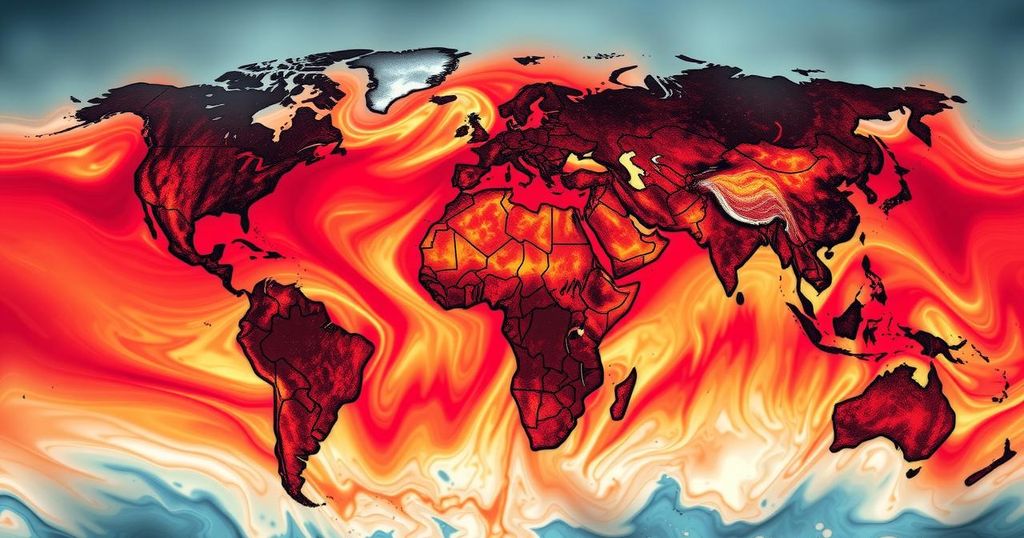In 2024, global temperatures reached record highs, marking the first time average temperatures exceeded critical warming limits. The UN and WMO warn of the severe implications of this trend on international climate goals, calling for urgent climate action to mitigate catastrophic outcomes. Various regions report extreme weather events leading to unprecedented costs and humanitarian crises, signaling an urgent need for global collaboration and comprehensive strategies to combat climate change.
Recent reports indicate that the years 2023 and 2024 have marked a significant increase in global temperatures, surpassing critical warming limits for the first time. According to the United Nations, this trend presents serious challenges to international climate goals, highlighting the urgent need for immediate, transformative climate action. UN Secretary-General Antonio Guterres emphasized that the record temperatures necessitate decisive measures to avert a climate crisis. The World Meteorological Organization (WMO) confirmed that 2024 has set new temperature records across various global datasets, extending a decade-long streak of extraordinary heat.
The WMO’s assessment revealed that average global surface temperatures reached approximately 1.55 degrees Celsius above pre-industrial levels, suggesting that we may have just witnessed the first year with a mean temperature of over 1.5°C since the late 19th century. Notably, climate experts state that this does not imply a permanent breach of the Paris Agreement’s long-term temperature targets but serves as a grave warning regarding humanity’s increasing exposure to extreme weather phenomena and the related costs.
In terms of impacts, various regions, including the United States and Europe, have experienced devastating weather events that incurred damages exceeding $300 billion. With wildfires ravaging Los Angeles and record temperatures straining vital ecosystems, experts warn that impacts are becoming increasingly pronounced. The rise in average temperatures is linked to more frequent and intense droughts and storms, further exacerbating humanitarian crises. The WMO and other climate organizations continue to call for urgent global cooperation to mitigate these alarming developments.
Scientific records indicate that exceeding the 1.5°C mark, even briefly, constitutes a significant warning sign of the precarious state of the climate. Experts have noted that every fraction of a degree increase holds profound implications for global climatic patterns. Notably, more significant changes may lead to unpredictable and severe climate conditions.
The growing threat of climate change has compelled global leaders to closely monitor rising temperatures and their implications. The 2015 Paris Agreement aimed to limit global warming to significantly below 2 degrees Celsius above pre-industrial levels, preferably to 1.5 degrees Celsius. This long-term goal is seen as essential for minimizing the risks and impacts of climate change. However, recent assessments highlight that the world is currently veering off track from these ambitious targets, raising alarms amongst climate scientists and policymakers alike. A combination of natural phenomena, such as El Niño, and ongoing human-induced emissions have contributed to unprecedented heatwaves and extreme weather events observed globally.
The alarming rise in global temperatures, as indicated by recent reports, underscores the urgency of addressing climate change. With 2024 confirmed as the hottest year on record, experts are sounding the alarm for immediate and transformative climate actions to prevent catastrophic repercussions. The data affirm that every fraction of a degree matters, reinforcing the need for cohesive international efforts and commitment to long-term climate agreements. The path forward is clear: decisive and swift actions are paramount to ensuring a sustainable future for our planet.
Original Source: www.fox28spokane.com






